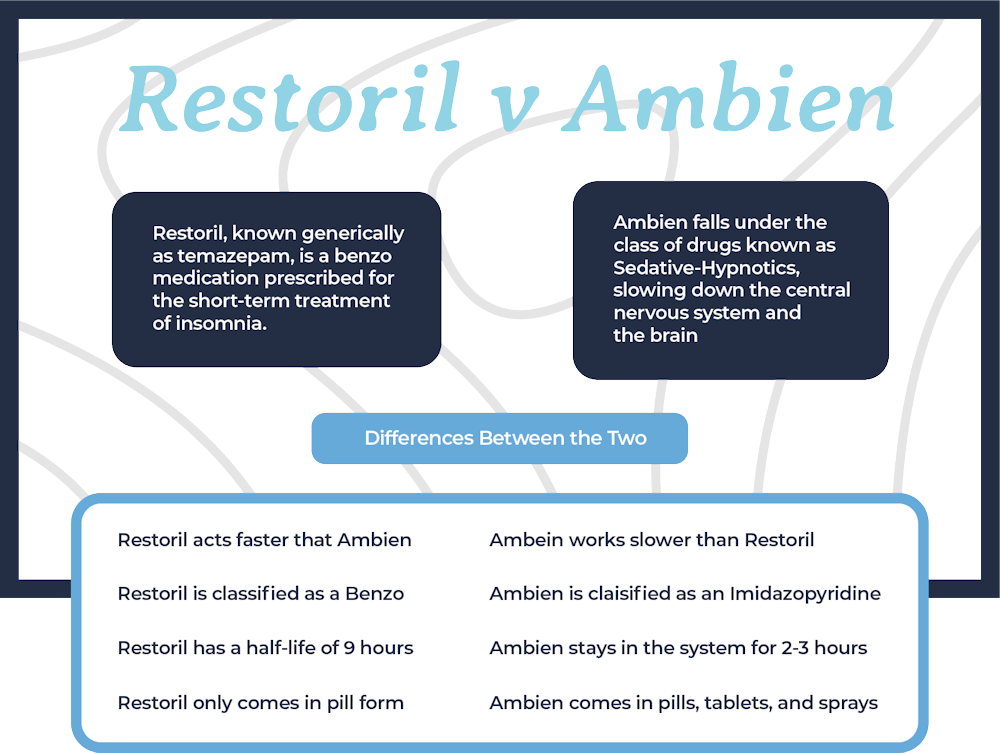Getting sufficient sleep helps with every aspect of our daily lives. If cutting back on caffeine, eating a healthy diet, and getting an age-appropriate amount of daily physical activity did not improve your sleep, your doctor may have prescribed sleep medication like Restoril or Ambien. If your sleep issues are undiagnosed, you may rely on over-the-counter medications like Benadryl to help you sleep. It is easy to develop a tolerance to sleep medications or start using stimulants to counteract their effects. If your dependence on sleep medication is causing problems in your life, a good drug rehab program can help. To learn more about Restoril addiction treatment, contact Crestview Recovery today by calling 866.262.0531.
We Need Sleep
Of course, healthy people should get eight hours of sleep each night. Nonetheless, many have trouble drifting off into dreamland. In fact, research cited by Science Daily found 25% of Americans have acute insomnia. To explain, this sleep disorder keeps people awake for long periods of time. Thus, their doctors usually write prescriptions for sleeping pills. That’s where choosing Restoril vs Ambien comes in.
Presently, around 57 million Americans with insomnia have several prescription drug options. A few include Lunesta, Rozerem, Belsomra, Halcion, and more. Overall, these oral pills help people fall asleep to prevent tiredness and irritability. That said, all sleeping pills, including Restoril and Ambien, have side effects that often include dependence. Over time, patients often become dependent on higher sleeping pill doses.
Restoril and Ambien: Similarities
First, the Restoril vs. Ambien debate should begin with how they’re alike. Of course, they’re both considered sedative-hypnotics or sleep aids. As such, these “Z-drugs” work by binding to brain receptors. Specifically, Restoril and Ambien activate the GABA neurotransmitter to relax users. Yet, both share some adverse side effects, such as:
- Drowsy feelings during the day
- Lightheadedness or fainting
- Headaches and blurry vision
- Memory and cognition trouble
- Dry mouth and tooth cavities
- Irregular heartbeat or pulse
- Trouble urinating and constipation
Again, Restoril and Ambien are designed to induce sleep for short-term use. Generally, the same dose becomes less effective for sleep in two to four weeks. During doses, both sedatives impair the user’s ability to drive. Further, individuals should not take either drug with alcohol. Likewise, both can cause painful withdrawal when stopped. Hence, finding an Ambien addiction treatment program or Restoril addiction treatment program is important.
Restoril & Ambien: Differences

Now, let’s explore how Restoril and Ambien differ. In fact, there are a few key differences between Restoril and Ambien. For starters, Restoril is a newer medication that’s only been on the market since 2007. On the other hand, Ambien has been around since way back in 1992. Secondly, Restoril is a brand name while Ambien is a generic name. That said, both medications are essentially the same thing. The key difference is that Restoril is faster-acting than Ambien.
There are also other considerations. On the one hand, Restoril is classified as a benzodiazepine. It’s a tranquilizer used for anxiety and insomnia. However, Ambien isn’t a benzodiazepine, but it is a sedative-hypnotic. Instead, professionals classify it as an imidazopyridine. Ambien only stays in your system for two to three hours. In contrast, Restoril has a half-life of nine hours for staying asleep.
Moreover, Ambien comes in pills, sublingual tablets, and oral sprays. Sometimes, doctors can provide extended-release Ambien, but Restoril only has one form. Restoril isn’t safe for expectant mothers, whereas individuals can take Ambien during pregnancy. Currently, Ambien is more strongly linked to walking, eating, and driving while asleep. Plus, the pricing of Restoril vs Ambien is typically cheaper.
Seek Treatment for Sleeping Pill Abuse Now
 Have you lost control of Restoril or Ambien use? If so, Crestview Recovery has quality substance use treatment programs for you. Our private, serene Portland facility is one of the Pacific Northwest’s best for fighting substance use. Furthermore, our therapists will provide holistic interventions for your unique sleeping pill problem. You’ll also enjoy amenities like ski trips. Our affordable spectrum of care includes:
Have you lost control of Restoril or Ambien use? If so, Crestview Recovery has quality substance use treatment programs for you. Our private, serene Portland facility is one of the Pacific Northwest’s best for fighting substance use. Furthermore, our therapists will provide holistic interventions for your unique sleeping pill problem. You’ll also enjoy amenities like ski trips. Our affordable spectrum of care includes:
- Residential drug treatment: This is our most immersive program, and it lasts anywhere from 30 to 90 days, depending on your unique situation. You’ll live at our center while you receive therapy, so you can focus solely on your recovery.
- Outpatient rehab: If you have a strong support system at home, this program may be for you. Outpatient treatment requires that you live at home but visit our center for therapy several times a week.
- Partial hospitalization program (PHP): This program is similar to outpatient rehab, but you’ll spend significantly more time at our facility receiving treatment.
- Dual diagnosis treatment: If you have a co-occurring mental health disorder, this program addresses both disorders simultaneously.
Don’t try stopping long-term sleep medication use alone. Rather, turn to the friendly, caring staff at Crestview Recovery. We’ll put you on the path to lasting sobriety. Without delay, call 866.262.0531 to learn more about our remarkable addiction treatment programs.
































